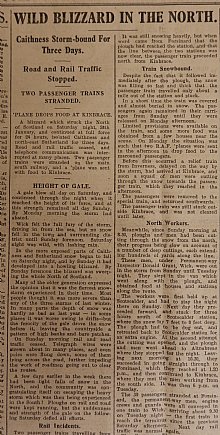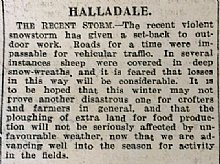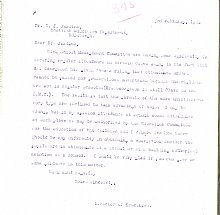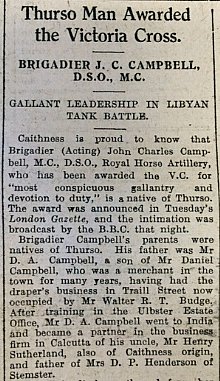Week 127: 2-8 February 1942
In Russia this week Soviet forces continued their winter offensive, driving the Germans out of Kursk near the border with Ukraine. The Japanese bombed Java and New Guinea, and closed in on Singapore; in Bataan in the Philippines, American forces continued their fighting retreat against the Japanese invaders. And on 6 February the British and Americans held the first conference of the Allied Combined Chiefs of Staff.
 Back in Caithness, the snowstorms that had afflicted the county over the previous few weeks showed no signs of stopping. The worst weather had come the previous week, and the John O’Groat Journal now reported the “Wild Blizzard in the North” of 24 January that “continued at full force for 24 hours, isolated Caithness and north-east Sutherland for three days. Road and rail traffic ceased, and telephone communication was interrupted at many places. Two passenger trains were stranded on the main south railway, and a plane was sent with food to Kinbrace,” near Helmsdale.
Back in Caithness, the snowstorms that had afflicted the county over the previous few weeks showed no signs of stopping. The worst weather had come the previous week, and the John O’Groat Journal now reported the “Wild Blizzard in the North” of 24 January that “continued at full force for 24 hours, isolated Caithness and north-east Sutherland for three days. Road and rail traffic ceased, and telephone communication was interrupted at many places. Two passenger trains were stranded on the main south railway, and a plane was sent with food to Kinbrace,” near Helmsdale.
 Once again, schools across the county were affected. Bower School wrote plaintively in its Log Book on 4 February: “Heavy snowstorm, all roads snowbound. Two teachers present but no pupils.” [4 Feb Bower School heavy storm, roads snowbound] And on Feb 6 Stanstill School Log Book records simply, “The pupils were sent home on Tuesday owing to [snow] drift.”
Once again, schools across the county were affected. Bower School wrote plaintively in its Log Book on 4 February: “Heavy snowstorm, all roads snowbound. Two teachers present but no pupils.” [4 Feb Bower School heavy storm, roads snowbound] And on Feb 6 Stanstill School Log Book records simply, “The pupils were sent home on Tuesday owing to [snow] drift.”
 Farmers in rural districts were also badly hit. The John O’Groat Journal reported poetically that in Halladale, “The recent violent snowstorm has given a set-back to outdoor work. Roads for a time were impassable for vehicular traffic. In several instances sheep were covered in deep snow-wreaths, and it is feared that losses in this way will be considerable.”
Farmers in rural districts were also badly hit. The John O’Groat Journal reported poetically that in Halladale, “The recent violent snowstorm has given a set-back to outdoor work. Roads for a time were impassable for vehicular traffic. In several instances sheep were covered in deep snow-wreaths, and it is feared that losses in this way will be considerable.”
 Meanwhile the Director of Education was having difficulties quite apart from the weather. The problem, as he explained in a letter to the Scottish Education Department, was that many children were not being taught in regular schools because of the war, but in church halls and other venues. Mr Georgeson, solicitor and clerk to the School management Committee, had ruled that as a result it wasn’t possible to prosecute the parents of children who failed to attend: “The result is that the parents of the more unsatisfactory type are inclined to take advantage of this”. As the Director said: “I cannot see how there should be any difficulty in obtaining a conviction whether the pupils are in attendance at a school or at a building authorised as a school.”
Meanwhile the Director of Education was having difficulties quite apart from the weather. The problem, as he explained in a letter to the Scottish Education Department, was that many children were not being taught in regular schools because of the war, but in church halls and other venues. Mr Georgeson, solicitor and clerk to the School management Committee, had ruled that as a result it wasn’t possible to prosecute the parents of children who failed to attend: “The result is that the parents of the more unsatisfactory type are inclined to take advantage of this”. As the Director said: “I cannot see how there should be any difficulty in obtaining a conviction whether the pupils are in attendance at a school or at a building authorised as a school.”
 Finally this week, the John O’Groat Journal reported the award of the Victoria Cross to Brigadier John Charles “Jock” Campbell of Thurso for “most conspicuous gallantry and devotion to duty” in the Western Desert campaign the previous year. Brigadier Campbell led a small force defending the aerodrome of Sidi Rezegh near Tobruk on 21 and 22 November from attacks by two armoured divisions of the Afrika Korps. Directing the battle from the back of a tank, Campbell on several occasions manned a gun to replace casualties, and refused to leave the field when he was wounded. As one writer said, Campbell won the VC many times that day.
Finally this week, the John O’Groat Journal reported the award of the Victoria Cross to Brigadier John Charles “Jock” Campbell of Thurso for “most conspicuous gallantry and devotion to duty” in the Western Desert campaign the previous year. Brigadier Campbell led a small force defending the aerodrome of Sidi Rezegh near Tobruk on 21 and 22 November from attacks by two armoured divisions of the Afrika Korps. Directing the battle from the back of a tank, Campbell on several occasions manned a gun to replace casualties, and refused to leave the field when he was wounded. As one writer said, Campbell won the VC many times that day.
Coming soon! Week 128, 2nd - 9th February 1942, will be published on Monday 9th February 2015. To view previous issues please use the menus on the right hand side of the page.
Come and join us on Facebook, let us know what you think about Caithness At War, ask any questions you may have or just say hello! Click on the Facebook link below to be taken directly to our page.
www.facebook.com/caithnessarchives
Comments
It was a big loss as they would have had lambs in April. We kids did not grasp how much it meant to our parents at the time.
Snow ploughs in those days were puny and were accommpanied by great squads of men who physically dug through huge drifts but only main roads were cleared.
The drifts were so bad that we had to take a shovel in with us to dig our way out in the morning.
We were off school for over a week and we children spent the time playing ludo and snakes and ladders. We had to help on the farm carrying water to the cattle and horses and hacking frozen turnips to feed the sheep.
We ran out of coal and had to rely on frozen peats and my father cut down an old tree.
No bread even if we could get to the village so we had to eat flour and oat meal bannocks and lots of pancakes.
I remember reading about the Thurso "VC" as he had the same name as myself - it was s piece of good news for a change.





